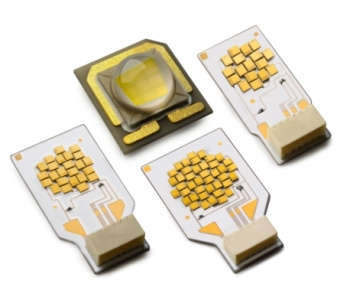Philips Lumileds today introduced LUXEON S, its second generation illumination-grade multichip emitters which offer twice the lumen density of existing solutions - an R9 value that exceeds 80 and has 50 percent better Color over Angle (COA) variation over existing solutions.
 LUXEON S1000, S2000, S3000 and S5000 emitters simplify the design of compact spotlights and downlights for architectural, retail and entertainment lighting solutions. (PRNewsFoto/Philips Lumileds)
LUXEON S1000, S2000, S3000 and S5000 emitters simplify the design of compact spotlights and downlights for architectural, retail and entertainment lighting solutions. (PRNewsFoto/Philips Lumileds)
Philips Lumileds is demonstrating the new LUXEON S emitters this week at Strategies in Light, February 12-14 in Santa Clara, California (Booth #205).
Designed for retail, architectural and entertainment applications, LUXEON S emitters deliver up to 50 lumens per square millimeter and a high light output of up to 8000 lumens in narrow beams with sharp shadows.
Because of the challenges in creating a small footprint with tight beam angles and high lumen density, luminaire designers have had to deal with large optics and limited lumen levels. With LUXEON S, luminaire designers have more flexibility and can achieve beam angles in the 8 degree range in a compact design, with light levels that rival traditional CDM light sources. This flexibility enables never-before-possible Center Beam Candle Power (CBCP) of over 50,000 candela, compared to other LEDs, like Chip on Board (COB) solutions, with a larger Light-Emitting Surface (LES) that achieve less than 20,000-25,000 candela.
"With a lumen density that is twice that of available solutions, the LUXEON S can offer light outputs as high as 8000 lumens at half of the optical size, enabling LED approaches to replace traditional ceramic discharge metal-halide (CDM) lamps in spotlight and architectural applications," said Orson Lo , director of LUXEON S products for Philips Lumileds. "Relative to CDM lamps, LUXEON S-based lamps offer comparable efficacy of 90 lm/W but with instant-on operation, better color consistency and four times the expected lifetime at 60,000 hours."
The new emitters feature correlated color temperatures of 2700K and 3000K with a CRI of 80 or 90, as well as CCTs of 3500K, 4000K and 5000K at CRI of 80. In the 90 CRI products, R9 value exceeds 80, making them ideal for applications requiring exceptional color renderings such as in premium retail and museum applications.
For more information on the LUXEON S product family, visit www.philipslumileds.com/products/LUXEON-S.
Source: http://www.philipslumileds.com